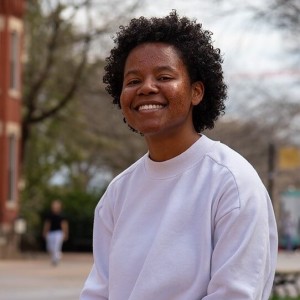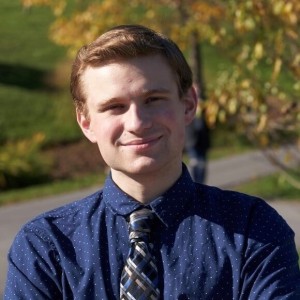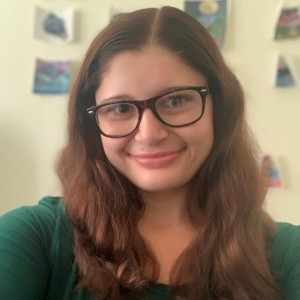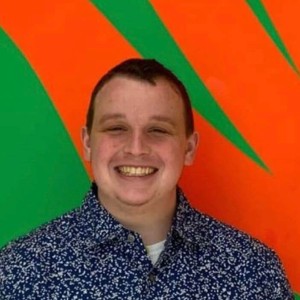Research Experience for Undergraduates (REU)
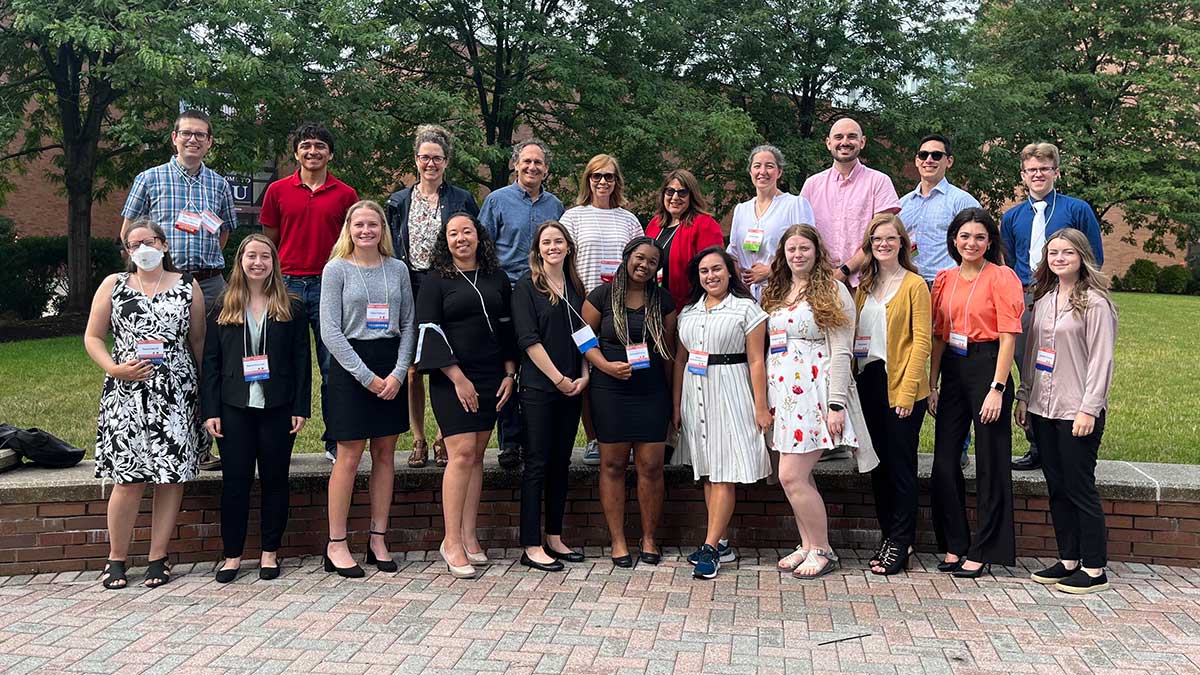
Research Experience for Undergraduates (REU)
- RIT/
- Center for Advancing Scholarship to Transform Learning/
- Research/
- Research Experience for Undergraduates
Our STEM Education Research REU did not receive funding for 2025. We intend to reapply for funding in hopes of starting the REU again in 2026 and beyond.
Previous funding came from the National Science Foundation, awards 1359262, 1757477, and 2149957. Information about NSF sponsored REU projects can be found here.
The accepted students will be involved in mentored-research projects in multidisciplinary education research on student success in STEM. These undergraduate researchers will be part of a vibrant community of education researchers and contribute to publishable research in STEM Education Research.
What is STEM Education Research?
STEM Education Research is conducted by experts in a scientific field who apply a combination of scientific disciplinary expertise, educational and social-science research methods, and findings from the cognitive and neurosciences to investigate questions about undergraduate learning within a scientific field. The broad goals of this field of research are to:
- understand how people learn the concepts, practices, and ways of thinking of science,
- understand the nature and development of expertise in a discipline,
- identify and measure appropriate learning objectives and instructional approaches that advance students toward those objectives,
- contribute to the knowledge base in a way that can guide the translation of findings to classroom practice, and
- identify approaches to make science and engineering education broad and inclusive.
Will I Have a Project Mentor?
Yes! During the program students will engage in rigorous education research projects with the support and collaboration of research mentors. Through a variety of activities we will build and support students’ research, communication and professional skills to help prepare them for STEM Education Research Ph.D. programs and careers. We will introduce our potential future educators to teaching, learning, and assessment of the core scientific practice of modeling. Students in this program will disseminate their findings at conferences and through scholarly publications.
Examples of Past and Current Projects
*interdisciplinary projects (marked) are listed under discipline of primary researcher and we note which projects are interdisciplinary, e.g. "Explorations of faculty empathy (interdisciplinary)"
A Black Box Framework of Protein Folding:
The ability to comprehend the 3D nature of proteins and the chemical bonds that drive the process of protein folding are important for understanding structure-function relationships, protein-protein interactions and the impact of mutations on a protein product. Although the process of protein folding is foundational in biology and biochemistry, students struggle to master this knowledge. Details of complex processes are often “hidden” from learners, in an attempt to simplify information and prevent confusion. These hidden packets of detail, which are often the mechanistic parts of the process, are “black boxes”. Using information in college biology and biochemistry textbooks, we have developed a preliminary framework to describe the process of protein folding and what information is explicit vs hidden for learners”. We hypothesize that the lack of process-oriented explanations leaves a gap in understanding of protein folding for students and leaves many important concepts hidden from learners.
Student Conceptions of ATP Hydrolysis:
Biological phenomena are dependent on the laws of chemistry, but clear connections biology and chemistry are not always explicit for undergraduate learners. The discussion of energy is often a critical portion of each of these fields, but visual diagrams and explanations about energy can vary by discipline. We explored how visuals diagrams in various college textbooks and found distinct differences between the disciplines. We also found that changing the canonical “Biology” diagram of ATP hydrolysis can provoke students to think differently the underlying ideas about hydrolysis, bond breakage and bond formation. We hypothesize that biology resources may inadvertently lead students astray on topics related to ATP hydrolysis and energy.
Mechanistic Reasoning about Molecular Genetics:
Concepts and processes related to molecular biology and genetics are challenging for learners. In traditional teaching and assessment, students not always probed to think deeply about the underlying process, but to focus on the result of the process or the “outcome”. To help students develop scientific expertise and critical thinking about biological phenomena, we need to help students activate and practice their mechanistic reasoning skills. We have been exploring how biology experts and learners demonstrate their mechanistic reasoning ability by asking them to answer and explain a challenging molecular genetics scenario prompt.
Critical Thinking with Collaborative Construction of Analogies:
Analogies are frequently used in STEM education and in professional settings to make abstract topics meaningful and easily comprehensible. Additionally, the ability to construct analogies requires many of the same skills as critical thinking, which are not always taught in classrooms. In this qualitative research study, college students who have taken at least one biology class (n=30) were given a critical thinking task based on the central dogma of molecular biology. A strong relationship was discovered between participants’ performance on the analogies and evidence of critical thinking. While practice using analogies marginally improved participants’ performance, collaboration with a partner had a drastically greater impact.
The Universal Design of Sign Language Incorporation in Chemistry Education:
Using your hands to model a concept or even move your hands to mirror a transition state is a powerful way for students to think about the electron pushing formalisms we write on paper and recognize mechanistic trends. Using our hands as models transforms the two-dimensional static framework of writing symbolic drawings on our page into 3-D opportunities for students to conceptualize a molecule or even a transition state. The Sign Language Incorporation in Chemistry Education (SLICE) project was initiated by a group of faculty and Deaf/Hard of Hearing (D/HH) students at RIT to address the language vacuum of STEM signs in organic chemistry. The result of our work has had a positive impact on the classroom culture and performance gains of D/HH students taking the organic chemistry courses. Now, efforts have begun to investigate the impact of universal design across all students in the organic chemistry curriculum.
Correlations between coding lab materials and observational protocols using Reformed Experimental Activities (REActivities):
Creating new materials for delivery in a chemistry laboratory is a common practice. What rubrics are available to assess the utility, effectiveness or even learning outcomes intent of the professor who wrote them? We analyzed the REActivities lab workbook and are working to correlate the nature of student-to-student interactions occurring during the lab through observational protocols. We interested in learning how the laboratory activities promote (or not) student engagement related to conceptual understanding.
Exploring the Integration of Calculus in Engineering Curricula
Calculus is a required component of most, if not all, engineering majors. Often, students find the math requirements challenging to navigate and fail to see the connection between these math requirements and their engineering learning. Part of the reason may be that required calculus courses are not well integrated within the engineering curricula and are often taught outside the context of real-world engineering problems. This research will seek to deeply understand this problem by exploring how calculus instruction and mathematical concepts are integrated into engineering curricula across the years and how they contribute to students' success in engineering courses. The study will rely on both a survey of the existing literature and empirical data.
Design of first-year engineering courses
First-year engineering courses provide an important milestone in students' success in their degrees. They pave the way for future success and impart key engineering skills such as design and problem solving. However, the way first-year engineering courses are offered across different universities varies significantly. This study seeks to explore the differences in the various first-year engineering courses in terms of their design and delivery. Data will be collected in the form of course syllabi, assignment, and interviews with course instructors, designers, and program directors. The outcomes will provide engineering educators with different ways of designing the first-year courses.
Studying those who leave engineering
Retaining first-year engineering students into the major is a key area of concern within engineering programs. To this end, initiatives are undertaken by the programs in terms of providing students with the required institutional support to succeed, designing the curricula that is more inclusive, and adopting other inclusive teaching and learning approaches. Yet, several students leave engineering within the first two semesters of their degrees. This research seeks to learn from those who leave the reasons for their leaving the field of engineering. The expected outcome will be identifying the missing support systems and curricular practices that force students to leave the discipline.
*Computational Literacy across STEM Disciplines:
Computational skills are essential to modern scientific research and critical in a wide range of science and engineering jobs. Computational literacy is a framework that helps describe the different elements of computational skill development, which includes the application areas, foundational skills, and social practices needed to use computation in science. We are doing research on how computational literacy varies between scientific disciplines and how it can be assessed in classrooms and using different forms of computational assignments.
*Novel Statistical Analyses of Student Success:
This quantitative project looks at 10+ years of RIT grade data to identify new ways of investigating student success. One potential question is whether students are more successful when taking multiple successive classes with the same classmates (the “cohort” model). By looking at performance as a function of students’ connectivity with their classmates, we seek to identify critical “community-building” courses and how community-building and other such factors can affect student persistence and long-term success.
*Noticing, Empathy and Equity in STEM:
This qualitative project investigates how faculty and students consider each other’s alternative interpretations and experiences, particularly during episodes of perceived bias, exploring how race, gender and other characteristics impact empathy and action.
*How Emerging STEM Education Researchers develop their sense of research identity:
This project looks at how graduate students, postdoctoral researchers, and faculty new to education research engage with this new discipline, grappling with new language, questions, and methods. We identify obstacles and barriers and compare two models for mentoring: gatekeeping, which focuses on certifications and milestones and groundskeeping, which emphasizes networking and environmental development.
*Expanding “research ethics” to include student success:
This project explores the role student personal and professional success play in an expansive view of ethical STEM research. We apply the Aristotelian concept of flourishing to expand the definition of ethical research to include student development beyond scientific expertise and investigate faculty and student understandings of this goal.
Career decisions of physics majors:
This project is investigating the factors that influence undergraduate physics majors' interests and career aspirations. The project includes qualitative data analysis to create graphical flowcharts explaining students' stories as well as the development of a new assessment of career decision-making.
Quantum Information Science Education:
We have two thrusts related to quantum information science. First, we are developing and testing educational resources related to quantum sensing. Second, we are characterizing the job opportunities, relevant skills and knowledge, and educational opportunities in quantum information science.
Cohorts
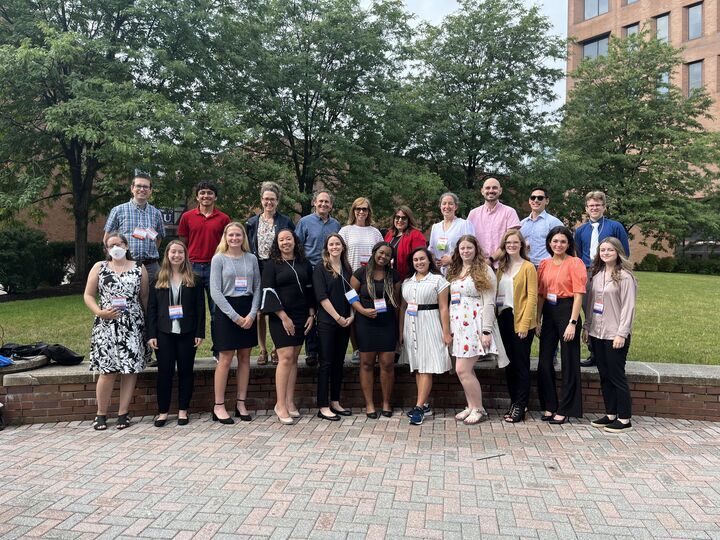
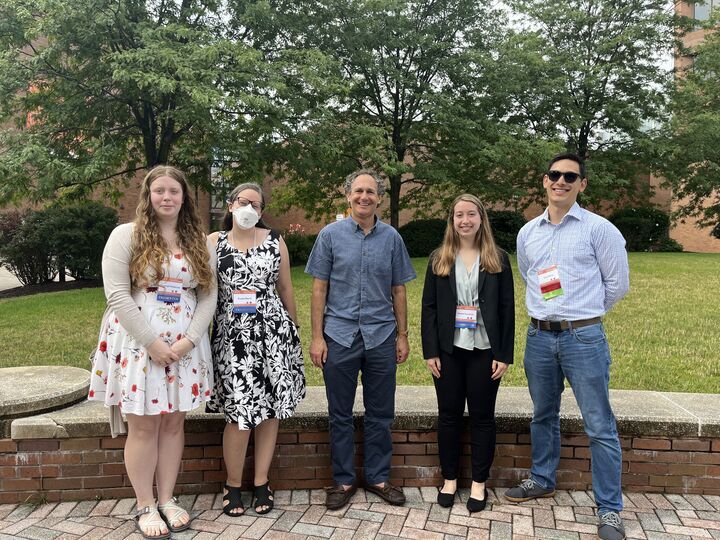
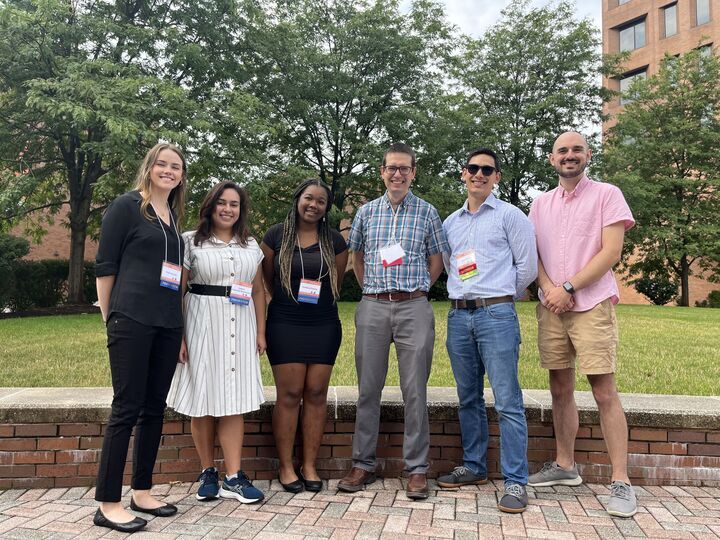
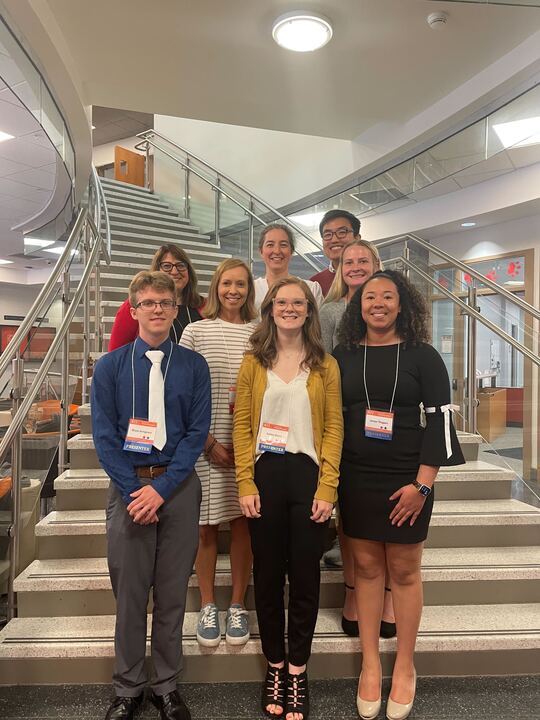
University of Arkansas at Little Rock
Kansas State University
University of Alabama at Birmingham
California State University
McDaniel College
Emory University
University of Pittsburgh
Cornell University
Coe College
Other Summer Researchers
- Pedro Cardona
- Micah Campbell
- Jonathan Lutzer
- Micaela Nelson
- Eugene Ham
- Paige Daly
- Julia Biehler
Travel to and Living at RIT
Travel to RIT
Participants will need to make their own travel arrangements to and from Rochester, NY. Travel funds are available to help defray travel costs.
For students that drive to RIT, parking is available on campus.
The Greater Rochester International Airport (ROC) is a 15 minute drive from RIT, and the most convenient airport for coming to Rochester.
Living at RIT
REU participants will live in RIT’s University Commons, a state-of-the-art facility. Each furnished suite contains four separate bedrooms, two bathrooms, and a common living area complete with kitchenette. Learn more about University Housing.
Laundry Services
Washer and dryer machines are available for use at no charge. You need to provide your own laundry detergent.
Appliances
The kitchenette does not include a microwave or coffee machine.
Linens
You will be provided with two flat sheets, two towels, one washcloth and one cotton blanket. You must bring your own pillow.
Additional items
Think of University Commons as your apartment for 9 weeks, so bring anything that you will need during that time. There are buses to transport you to local shopping centers and the mall so you can also purchase items once you arrive in Rochester.
Participants will be living in RIT apartments furnished with kitchens and basic kitchenware and tableware. Participants will be responsible for their own meal preparations. Multiple grocery stores and shopping centers are located within 10 minutes from campus. Participants also have several options for purchasing food and meals on campus. For a list of campus restaurants, cafes, and food courts visit RIT Dining Services.
Funding
2022-2024: NSF grant DUE-2149957: Research Experiences for Undergraduates: Multidisciplinary Research on Student Success in STEM at the Rochester Institute of Technology
2019-2021: NSF grant DUE-1757477, REU Site: Research Experiences for Undergraduates in Model-based Reasoning in STEM Education at the Rochester Institute of Technology
2015-2017: NSF grant DUE-1359262, REU Site: Model-Based Reasoning and Representations in Science, Technology, Engineering, and Mathematics (STEM) Learning at the Rochester Institute of Technology (RIT)
NSF Statement on Non-Tolerance of Sexual Harassment
The National Science Foundation (NSF) will not tolerate sexual harassment, other forms of harassment, or sexual assault within the agency, at awardee organizations, field sites, or anywhere NSF-funded science and education is conducted. The 3,000 U.S. institutions of higher education and other organizations that receive NSF funds are responsible for fully investigating complaints and for compliance with federal non-discrimination laws, regulations, and executive orders. NSF has taken steps to help ensure research environments are free from sexual harassment. Additionally, NSF is bolstering our policies, guidelines, and communications so that organizations funded by NSF clearly understand expectations and requirements.
NSF is working to make certain that recipients of grants and cooperative agreements respond promptly and appropriately to instances of sexual harassment, other forms of harassment, or sexual assault. A community effort is essential to eliminate sexual and other forms of harassment in science and to build scientific workspaces where people can learn, grow, and thrive.
For any questions, comments, or concerns regarding sexual or other forms of harassment, please contact the Office of Diversity and Inclusion (ODI), National Science Foundation, 2415 Eisenhower Avenue, Alexandria, VA 22314, email: harassmentnotifications@nsf.gov; telephone (703) 292-8020; FAX: (703) 292-9482.
Contacts
Tony Wong



